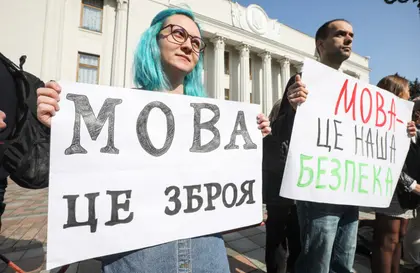A newly released report, prepared for the Cabinet of Ministers of Ukraine, has found there has been “significant progress” in the adoption of the Ukrainian language, during Russia’s full-scale war on Ukraine.
Released on April 30, the report is the third annual report by the Government “rapporteur” on the status of Ukrainian, as the official state language in 2022.
JOIN US ON TELEGRAM
Follow our coverage of the war on the @Kyivpost_official.
The increase in “self-Ukrainization,” within society, is a phenomenon that the report highlights: “The swift growth in the level of social support for the official language, and its comprehensive increase in public forums, as well as privately, has led to it [the Ukrainian language] being a powerful, nation-building factor that unites citizens, strengthens civic participation, and enables resistance to [Russia],” the report stated.
Research during 2022 by the polling agency Info Sapiens, which is cited by the report, showed that:
· The number of Ukrainian residents who identified as primarily Russian-speaking had halved following the full-scale Russian invasion; from 26% to 13% of those surveyed.
· The number of Ukrainian residents who identified as primarily Ukrainian-speaking after the Russian full-scale invasion had increased by 16%; from 46% to 69%.
· In 2020, 69% of Ukrainians said they were proud to be citizens of Ukraine; in August 2022, that figure had risen to 98%.

‘We Are Blocking Propagandists’ – Zelensky Imposes Sanctions on Pro-Russian Politicians
The Ukrainian language, according to the report, has also played an increased role in the so-called "information war."
“The language in which news is broadcast, has become an important factor in terms of public trust of the news source and its contents. It is also a means of establishing and protecting a distinct Ukrainian media space, which is resistant to the influence of Russian propaganda and informational and psychological special operations of the enemy,” the report said.
Among its content, the report reviewed legislative moves associated with Ukrainian as the state language.
For example, after several years of development and debate, the Verkhovna Rada of Ukraine, the country’s national parliament, ratified a media law in December 2022.
That law enshrines provisions for the use of Ukrainian by media outlets, including a requirement that at least 75% of nationally broadcast television and radio content be in Ukrainian by Jan. 1, 2024.
The impact of the Russian full-scale invasion on the Ukrainian language is also examined by the report:
“The full-scale invasion by Russian forces highlighted that the intentional destruction of the Ukrainian nation is the long-term policy of the Kremlin, which anticipates not only the physical destruction of Ukrainians, but also Ukrainian identity, of which language is an inalienable part,” it said.
“[Indeed], a basis for Russian military aggression and the mass killings of Ukrainians has been the so-called ‘language question’ and the false claim of ‘defending Russian language speakers,’” the report said.
The report outlines that, regardless of which territory, occupational authorities are “cancelling or squeezing out Ukrainian language [and] replacing it with Russian…in the public, cultural, education, media and official spheres of society.”
Ukraine’s President, Volodymyr Zelensky, grew up in Kryvy Rih in a Russian-speaking household.
Soon after being elected in 2019, he said to an event that his “level of the Ukrainian language, in my opinion, is growing. I know that there are mistakes with accent marks and some words. I want to speak better. Perhaps, one can’t know the language one hundred percent. But I’m trying to master it, practice it, speak more, better with smart people.”
Zelensky has delivered his nightly national television address almost exclusively in Ukrainian since Russia’s full-scale invasion began in late February 2022.
You can also highlight the text and press Ctrl + Enter










